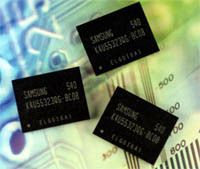Samsung sends GDDR4 graphics memory into mass production
San Jose (CA) - Graphics cards could soon see a boost in speed with the next generation of graphics memory having entered the first stage of mass production. Samsung says that the technology is able to process images about 33% faster than today's GDDR3 memory.
Samsung manufactures the first GDDR4 memory modules in 80 nm and claims that each in input/output pin of the memory has a data processing bandwidth of 2.4 Gb/s, which compares to about 2.0 Gb/s of GDDR3 memory.
While the company is delivering on its earlier promise to begin mass production in the second quarter of 2006, the memory is substantially slower than initially indicated: In October 2005, Samsung said it would launch the technology with a bandwidth of about 2.8 Gb/s; in February of this year, the company claimed to have developed a 3.2 Gb/s version of its GDDR4 memory - which should be an indicator that GDDR4 has headroom to scale to significantly higher speeds in the future.
Besides additional performance, Samsung also says the new generation - which is still based on DDR2 technology - the fastest GDDR4 memory (2.4 Gb/s) consumes 45% less power than a 2.0 Gb/s GDDR3 version. The first GDDR4 devices offered by Samsung will be shipped in a 512 Mb, 32-bit data bus configuration.

Samsung GDDR4 memory
It is unclear at this time when we will see GDDR4-equipped graphics cards entering to become available on the market. However, Nvidia and ATI participated in Samsung's product announcement and Tony Tamasi, the firm's vice president of technical marketing was quoted saying "GDDR4 is poised to become the next major evolutionary step for [Nvidia's] GPUs." Joe Macri, ATI senior director of engineering and chair of the JEDEC committee on GDDR4 added in a prepared statement: "We're delighted that we'll be able to use GDDR4 from Samsung in our latest graphics cards."
That statement appears to put rumors at rest that Rambus' XDR memory could become a widely accepted solution for next-generation graphics cards. According to Samsung, 3.2 Gb GDDR4 is able to match the performance of first-generation XDR memory (which offers a total bandwidth of 12.8 GB/s) and may be able to exceed XDR's performance on high-pin-count memory devices. The company conceded that GDDR4 will not be able to match XDR performance on low-pin-count designs.
Stay on the Cutting Edge
Join the experts who read Tom's Hardware for the inside track on enthusiast PC tech news — and have for over 25 years. We'll send breaking news and in-depth reviews of CPUs, GPUs, AI, maker hardware and more straight to your inbox.
Most Popular

